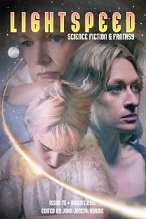“Those Brighter Stars” by Mercurio D. Rivera
Reviewed by Bob Blough
Lightspeed this issue is not publishing any heavy hitters for awards notification but it is a solid issue, with only one story being lamentable.
Mercurio D. Rivera writes “Those Brighter Stars” as a letter from a girl to her estranged mother. Ava tells her mother about her life since she was abandoned at the age of six. Ava was diagnosed somewhere on the Autism spectrum and her mother had left the family at the same time. Ava has overcome her final diagnosis of “acute empathetic” and Temple Grandin-style works her way into a world of animal husbandry. Ava can feel the emotional output of animals but not humans.
She is then hired to try to feel the emotions of the aliens who will land on Earth in three years, with her mind suitably augmented. Her daughter feels the same abandonment as felt by Ava with her mother while her father tries to hold things together. The death of her father sets the final scene for the revelation of the aliens.
I feel in my bones that this story should be better than it is. To take Temple Grandin as a template for a future meeting of two alien species is, I think, quite brilliant. Also, Ava’s home life from her childhood to the present is a beautiful human comparison with that. The third layer, that of a mother who Ava hates, adds another layer of emotion and depth. But somehow it all feels too forced. Instead of the needed subtleties that I would appreciate in the story, the basic themes are almost rammed down your throat at the start. Perhaps this needs to be worked into a longer size with the themes being a lot less glaring. A good work that I feel could have been great with some proper editing.
Next up is a comical take on the cliché of the perfect assassin who could rule the world but enjoys his island home and his anonymity too much to endanger his lifestyle with that sort of thing. “The Assassin’s Secret” by Adam-Troy Castro riffs on what that kind of life would be like and how this James Bond “super-villain” would get jobs.
The people who come to him with their sheaf of names for their proposed assassinations, or those who arrive with just one name all get equal attention from the assassin. I laughed out loud at several points with the use of all the clichés and types of people pestering him – only between 9 and 10 AM – of course. Good comedy is rare in SF. This one, while quite darkly funny, is a good example.
Jeremiah Tolbert has a wonderfully audacious imagination. Who would think of taking food (not to mention the current craze of food trucks) to its singularity point? And then making it believable? And then enjoyable? That is exactly what he does in “Taste the Singularity at the Food Truck Service.”
The plot involves two men who met each other at a cooking class when they were kids and have not seen each other since. One has become a bored accountant. The other a chef. Their chance meeting at a food truck called “Sticks” is the opening to a wild and wooly – yet wholly believable – yarn. Just as an idea “Sticks” is fascinating. It is a food truck where one can get anything on a stick. Anything—spaghetti, soup, you name it. It follows from there. A very good read and the best story in this issue.
Unfortunately it is followed by a YA story that is a mass of clichés. I read a lot of YA novels and sometimes they are better than any of the adult novels out there (A Monster Calls by Patrick Ness comes immediately to mind), so I was sorely disappointed when “The Siren’s Son” by Tristina Wright was so blandly written. The two sons – one a child of a dragon and a human mother, the other a child of a mermaid and a human father – fall in love and drama ensues. As a gay man, I was glad for the gay protagonists at first – but eventually their relationship was not deep enough to hold my attention.
Some great glimmerings of ideas in this issue but watch that Jeremiah Tolbert. He has greatness hidden within his audacity.
 Lightspeed
Lightspeed